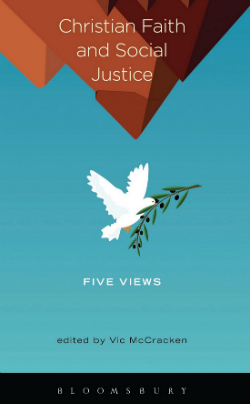Christian Faith and Social Justice
Five essays which contain useful nuggets and discussion starters
 Christian Faith and Social Justice - Five Views
Christian Faith and Social Justice - Five Views
Vic McCracken (ed)
Bloomsbury, London
ISBN: 978-1623568184
Reviewer: Alec Gilmore
When the press and the social media are at full throttle with stories of fairness and equality, hacking and privacy, health and social care, bankers‘ bonuses and immigration, a serious examination of social justice to discern, clarify and enrich what too readily descends into little more than soundbites and cliche, has to be welcome.
Here are five academics (four from the US and one from the UK) ready to engage in open dialogue to supply it.
After beginning with three very practical, commonplace down-to-earth thumbnail sketches of social justice, we have four examples of where the shoe pinches: scarcity of resources, diversity of custom and tradition, conflicting norms, and (not least) Christian tradition (italics mine), followed by five major essays on Social Justice and Christian Faith: Libertarianism, Political Liberation, Liberation Theology, Christian Feminism and Virtual Ethics, each with further comments from the other four contributors.
Does it work? For me not as well as I hoped. So wide was the gap between the ‘social justice on the ground’ where we started and the more detached approach in the essays (more like ‘social justice in academia’) that at times I wondered if the five contributors had read the opening chapter which set the scene. Fine for those who can take it but hardly what we were led to expect.
Nevertheless there are useful nuggets and discussion starters for Christians at grass roots to worry over. One route to social justice, for example, may be to explore the much neglected ‘Holy Saturday’ twixt Good Friday and Easter Day — living in the horror of Good Friday and no resurrection in view (p 90).
Other ways in are a quote from Malcolm X — ‘What is logical to the oppressor isn’t logical to the oppressed’ (p 79); or a Feminist Response showing how different ‘the basic issue‘ seems when you start in a different place (pp 31-2); or the claim that ‘ liberation is salvation‘ and how different much Christian teaching might have been if the Greek and Hebrew had been so translated (p 82), with the comment that conversion is never only personal, but must lead to social transformation (p 84) reminding us that a new society is a human project.
God may provide the Promised Land but we have to walk to get there. (p 86).
By no means a walk in the park, but (as the RAF would say) per ardua ad astra.
The Revd Alec Gilmore is a Baptist minister
Baptist Times, 11/09/2015